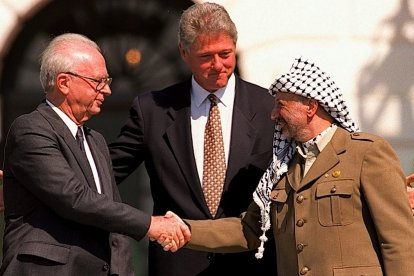The cruel lessons of the Oslo debacle remain unlearned
Sept. 13, 1993 should be remembered as a day of infamy for Israel and the Jewish people.

Isaac Rabin, Bill Clinton & Yaser Arafat, at the White House / Wikipedia.
We’ve seen this movie before. Palestinian Authority leader Mahmoud Abbas says something awful and antisemitic. Some in the international community, and even Jews who are ardent supporters of the peace process with the Palestinians, express dismay and demand an apology. That was the reaction to Abbas’s latest outrage in which, among other disgusting comments, he justified Adolf Hitler’s persecution of Jews.
It’s horrific, but it’s no different from similar instances of Abbas displaying his hatred for Jews, denial of Jewish history, and complete and utter lack of interest in peace. The same qualities were on display last year when, while visiting Berlin, he deflected a question about his involvement in the 1972 Munich Olympic massacre by falsely accusing Israel of committing “50 holocausts.” Or, in 2018, when in a speech to the Palestinian National Council he repeated the same antisemitic conspiracy theories about the Holocaust. That even prompted a New York Times editorial that called for Abbas to resign, acknowledging that it was hardly surprising that a man who had authored a doctoral thesis drenched in Holocaust denial would act in this manner.
But Abbas’s latest excursion into traditional tropes of Jew-hatred was particularly timely since it came just before the 30th anniversary of the signing of the Oslo Accords on the White House Lawn on Sept. 13, 1993. That event is best remembered by the photograph of President Bill Clinton stage managing a handshake between a clearly reluctant Israeli Prime Minister Yitzhak Rabin and a smug Yasser Arafat. But it was Abbas and Israeli Foreign Minister Shimon Peres who signed the document that day.
Abbas’s antisemitism and rejectionism should be at the forefront of any discussion of the impact of Oslo because it helps explain why the high hopes for peace that were shared that day were destroyed by years of terrorism.
But as we’ve seen with the recent push by the Biden administration to make more Israeli concessions to the Palestinians part of the “price” that Israel is being asked to pay for normalization of relations with Saudi Arabia, those in power have learned nothing from the history of the last three decades. Though it’s far from clear that an expansion of the Abraham Accords is likely in the near future, the exercise is being pushed by some veteran Oslo cheerleaders like New York Times columnist Thomas L. Friedman specifically as a ploy to topple an Israeli government that he considers too right-wing and to preserve the hopes for a two-state solution. To the Biden foreign-policy team and foreign-policy establishment mandarins who have been wrong about everything for decades, nothing should be allowed to interfere with their continued pursuit of an idea that was the product of delusional policymakers who didn’t understand the nature of the problem they were trying to solve.
The date of the Oslo signing ought to be seared into the collective memory of the Jewish people. But there will be few, if any, commemorations of the event, which was feted at the time among Israeli and American Jews with celebrations that could only be described as euphoric.
Even the most stubborn believers in land for peace have long since stopped lauding the accords. In Israel, the overwhelming majority of people learned over the following years of terrorism and bloodshed that rather than a historic reconciliation, the negotiations and the accords they produced proved an epic disaster rooted in wishful thinking. Even in the United States, where most liberal Jews and the Democratic administration still cling to the failed Oslo formula of “land for peace,” the accords are regarded with a degree of embarrassment. True believers in the peace process still stubbornly look for explanations for its failure other than the obvious one about the Palestinian lack of interest in ending their century-old war on Zionism and the Jews.
The empowerment of Arafat and the Palestinians was intended by Oslo’s Israeli architects to be a way to get them to give up their hopes for Israel’s destruction in exchange for an independent state. But instead of trading land for peace, all Israel did was exchange territory for terrorism. That was something that should have become abundantly clear even to the most obtuse observers when the years after September 1993 led to more attacks rather than fewer. That realization should have been sealed by Arafat’s rejection of the offer of statehood in the Gaza Strip, almost all of Judea and Samaria, and a share of Jerusalem made to him by Clinton and Israeli Prime Minister Ehud Barak at Camp David in 2000. Instead, he answered it with a terrorist war of attrition that came to be known as the Second Intifada, which lasted five blood-soaked years.
Rather than stopping his Hamas rivals from continuing terrorism as Rabin believed he would, Arafat never ceased fomenting, planning and paying for terrorism against Israelis and Jews. His successor, Abbas, who was initially thought to be far more reasonable than his former boss, has done the same. Jewish blood continues to be spilled as a result of the mistakes made by the architects of Oslo.
That’s not to say that there still aren’t some who rationalize Oslo.
And as long as the United Nations still pushes the lying Palestinian narrative about Israel’s illegitimacy and its being an “apartheid state,” the international community still acts as if Oslo hadn’t demonstrated the Palestinians’ unwillingness to make peace no matter what they were offered.
They argue, not without some justice, that handing over the administration of much of Judea and Samaria to the Palestinian Authority relieved Israel of the difficult job of governing the Arab population. The same argument is used to justify Ariel Sharon’s decision in the summer of 2005 to remove every Israeli soldier, settler and Jewish community from Gaza.
At least in theory, both decisions have strengthened the case against future Israeli concessions. Prior to Oslo, the arguments in favor of land for peace were much stronger than they are now that Arafat and Abbas demonstrated that no matter what they were offered or given, they were still unwilling to accept the legitimacy of a Jewish state, no matter where its borders were drawn.
No peace, no matter what …
The consequences of Oslo and the Gaza withdrawal, which allowed the strip to be transformed into a terror fortress as well as an independent Palestinian state in all but name, have been calamitous for Israelis. Time and again, they are forced to grab children and herd the elderly, and run full-speed to bomb shelters during rocket and missile barrages launched from the Strip. That’s a steep price to pay for a debating point.
But both Oslo and the Gaza withdrawal are held up by some as necessary, despite the horror they produced, because anything must be tried in the pursuit of peace, even if lives are lost in the process.
As much as supporters of Israel should have learned that the willingness of the Palestinians to end the conflict was misjudged, they should also have absorbed that the international community, mainstream press and foreign-policy leaders aren’t any more sympathetic to Israel as a result of the risks it ran and sacrifices it made than they were before 1993.
Indeed, it is entirely possible that they are less sympathetic to an Israel that was willing to gamble with the likes of a veteran terrorist like Arafat. Instead of saluting their courage for opening themselves up to the perils of empowering terrorists for the sake of peace, the world interpreted Oslo very differently. Rather than a generous gesture in which tangible assets and territory to which Israel had at least as good a claim as the Arabs were given up in exchange for the hope of some quietude, the international community viewed it as an Israeli admission of guilt for holding onto stolen goods.
To a large extent, most Israelis have absorbed these lessons as the election results that repeatedly put Oslo opponent Benjamin Netanyahu in the prime minister’s office have proved. But the success of the movement against judicial reform to some extent illustrates that the Israeli left is far from dead or understands how wrong they were 30 years ago when they were in charge of the country’s fate.
And as long as the United Nations still pushes the lying Palestinian narrative about Israel’s illegitimacy and its being an “apartheid state,” the international community still acts as if Oslo hadn’t demonstrated the Palestinians’ unwillingness to make peace no matter what they were offered.
That’s also true with respect to the United States where the Biden foreign-policy team remains undeterred by Abbas’s expressions of hate. They are still financially supporting a Palestinian government led by a Holocaust denier and antisemite, and trying to undermine Netanyahu in the vain hope that Abbas or a successor will finally vindicate their policy of pressuring Israel to weaken its security and give up its rights to parts of the ancient Jewish homeland.
Three decades of proof of Palestinian rejectionism hasn’t lessened the clamor for more land for peace trades that will lead to even more harm for Israel.
Thinking back 30 years ago, one can’t blame those who celebrated what they were told was a deal that would end the conflict. But we can fault those who refuse to draw conclusions from what followed. The pursuit of peace is an honorable calling, but when such efforts lead to more violence rather than conflict resolution and empower antisemites—as was the case with Oslo—then honoring the good intentions of those involved isn’t justified. In a world in which antisemitism is on the rise specifically because of the hatred for Israel that Abbas helps incite, actions that strengthen antisemites who are responsible for the murder of Jews shouldn’t be seen as noble or worthwhile. Much as we might want to still honor those who were prepared to gamble on peace, Sept. 13, 1993 should be remembered as a day of infamy for Israel and the Jewish people.
© JNS
RECOMMENDATION





















